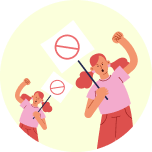Why is Plagiarism Bad? - Types and Reasons

Why Is Plagiarism Bad?
You may have heard from your instructor about avoiding plagiarism at all costs. But have you ever delved deep into the concept of this term and thought about why everyone advises avoiding it? If not, this is the place where you’ll get the answer.
In this blog, we’ll answer one of the most asked questions about plagiarism—why is plagiarism so bad? But first, we’ll refresh your concept about plagiarism and discuss its main types here. This way, you will have a proper understanding of the different faces of plagiarism. So, without wasting time, let’s start this discussion. Shall we?
Plagiarism — Definition & Common Types
Plagiarism, in simple terms, occurs when you use someone else’s wording and sentence structuring without their permission. However, everything with plagiarism is not as straightforward here because this problem often occurs in different forms. Some of the most common ones are as follows:
Direct Plagiarism
As the name indicates, direct plagiarism is the word-to-word copying and presentation of someone else’s work as your own without proper acknowledgment. This form is the most common type of plagiarism.
Mosaic or Patchwork Plagiarism
Combining text from multiple sources and presenting the entire thing as your own is patchwork or mosaic plagiarism. Like direct plagiarism, this type of plagiarism is also common among beginners.
Accidental or Unintentional Plagiarism
Everything that falls under the plagiarism bracket is still illegal, even if you do it unintentionally. So, when you misquote someone else or do not cite your sources properly, you become a victim of accidental or unintentional plagiarism.
Self Plagiarism
Let’s say that you previously wrote some text on a topic. And now that you’re working on a similar topic, you’ve reused some data from your previous work. Such a situation will give rise to self-plagiarism, which is another common form of this issue.
Why Is It Bad to Plagiarize Something?
Now that you understand plagiarism and its most common types let’s answer the following questions: Why is plagiarism wrong? To understand it, you must put yourself in the shoes of someone whose content got stolen.
So, imagine you’ve written something interesting after researching for several hours or days and posted it over the web. How would you feel if someone copied the exact thing and reposted it elsewhere? Annoyed, gutted, right? Well, that’s the main reason why everyone thinks that plagiarism is an immoral act.
When you copy someone else’s work, it may look like you’ve found an easier way to create the text. However, you will indirectly damage your creative and critical thinking abilities. And since these skill sets are crucial to survive in any sector (academic or professional) of life, their absence will do more harm than you can ever imagine.
For instance, once you’ve been found guilty of plagiarism, your reputation will be at stake forever. People will find it hard to believe you even if you’ve done nothing wrong. Sometimes, authorities may take legal action against or expel you from the institute. Therefore, it is best to avoid the problem of plagiarism at all costs.
Learn more: How to Remove Plagiarism?
What Is the Best Way to Steer Clear of Plagiarism? — Some Expert Suggestions
By now, you may have understood why everyone advises against plagiarism. If so, you may be curious about how to prevent it. So, these are some tried and tested techniques of experts that can help anyone avoid the issue of plagiarism altogether:
Use Your Own Understanding and Writing Style
All human beings differentiate from one another based on how we understand things. So, consider your unique approach if you’re writing on a popular topic. Think about how you would approach the same subject without looking at other examples. Once you’ve got something unique figured out, you will not most likely fall prey to plagiarism.
Understand the difference between Research and Copying
Everyone does some sort of research. However, there is a difference between doing research and copying ideas. You research to collect data on your topic and get your creative juices flowing. On the other hand, copying is replicating the existing information. If you follow the copying practice, you will fall prey to plagiarism, and your content will not hold any unique value. As a result, you will be just wasting your and your audience’s time.
Learn to Use the Ethical Practices of Taking Someone’s Data
There may be some instances where using data from an existing source becomes essential. In such situations, you must take assistance from ethical practices. Two of the most common ones are paraphrasing and quoting.
You can perform paraphrasing by explaining someone else’s content in your own words without changing the original intent. This technique especially comes in handy when the text you want to include is lengthy. (Note: You can also use a paraphrasing tool to paraphrase content.) Quoting, on the other hand, will be helpful when paraphrasing the text alters its original meaning. In such a case, you can wrap your desired text fragment in double quotations (" ") without changing anything. However, whether you use double quotes or paraphrasing, you must cite the source correctly. Otherwise, your work will still fall under the criteria of plagiarism.
Never Finalize Anything Without Checking Plagiarism
Once you’ve completely written everything, the last thing you need to do is to check your work for plagiarism. The best and most accurate way to do so is to use a reliable plagiarism checker. So, pick a trustworthy tool and perform a check for plagiarism. If the tool finds any underlying instances of plagiarism in your work, instantly work on them before finalizing. By following this practice, you can discover your text’s hidden plagiarism traces and act accordingly.
Learn More: (Is Plagiarism Illegal?)
Summing Up — Concluding Remarks
Plagiarism is using someone else’s wording without proper acknowledgment and presenting it as your own. From this statement, you may have understood that it involves stealing someone else’s information. This factor is mainly why committing this action is terrible everywhere, no matter which discipline of life you belong to. Therefore, to completely avoid it, rely on your writing style and tone. Even if you’re using data from somewhere else, you should use your own understanding to elaborate on it and run your text through a free plagiarism checker before finalizing. By following these practices, you will never fall prey to plagiarism and its associated consequences.











